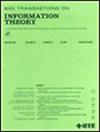Convergence Analysis of Probability Flow ODE for Score-Based Generative Models
IF 2.9
3区 计算机科学
Q3 COMPUTER SCIENCE, INFORMATION SYSTEMS
引用次数: 0
Abstract
Score-based generative models have emerged as a powerful approach for sampling high-dimensional probability distributions. Despite their effectiveness, their theoretical underpinnings remain relatively underdeveloped. In this work, we study the convergence properties of deterministic samplers based on probability flow ODEs from both theoretical and numerical perspectives. Assuming access to基于分数的生成模型的概率流ODE收敛性分析
基于分数的生成模型已经成为一种对高维概率分布进行采样的强大方法。尽管它们很有效,但它们的理论基础仍然相对不发达。本文从理论和数值两个方面研究了基于概率流ode的确定性采样器的收敛性。假设可以获得分数函数的$L^{2}$ -精确估计,我们证明了目标与生成的数据分布之间的总变化可以在连续时间水平上由${\mathcal {O}}(d^{3/4}\delta ^{1/2})$有界,其中d表示数据维数,$\delta $表示$L^{2}$ -分数匹配误差。对于使用步长为h的p阶龙格-库塔积分器的实际实现,我们在离散级建立了${\mathcal {O}}(d^{3/4}\delta ^{1/2} + d\cdot (dh)^{p})$的误差界。最后,我们给出了128维问题的数值研究来验证我们的理论。
本文章由计算机程序翻译,如有差异,请以英文原文为准。
求助全文
约1分钟内获得全文
求助全文
来源期刊

IEEE Transactions on Information Theory
工程技术-工程:电子与电气
CiteScore
5.70
自引率
20.00%
发文量
514
审稿时长
12 months
期刊介绍:
The IEEE Transactions on Information Theory is a journal that publishes theoretical and experimental papers concerned with the transmission, processing, and utilization of information. The boundaries of acceptable subject matter are intentionally not sharply delimited. Rather, it is hoped that as the focus of research activity changes, a flexible policy will permit this Transactions to follow suit. Current appropriate topics are best reflected by recent Tables of Contents; they are summarized in the titles of editorial areas that appear on the inside front cover.
 求助内容:
求助内容: 应助结果提醒方式:
应助结果提醒方式:


